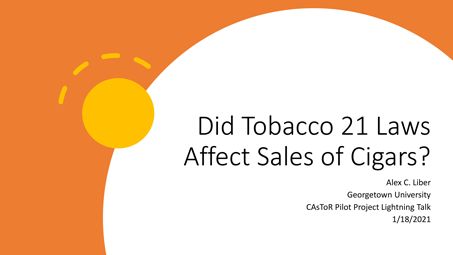“The effects of Tobacco 21 adoption on cigar sales in the US” with Dr. Alex Liber (Georgetown University)
- Contact the presenter
- Dr. Alex Liber <alex.liber@georgetown.edu>
- View Abstract +
- Laws raising the minimum age of sale to 21 years of age for tobacco products (Tobacco 21 or T21 laws) proliferated across the US in the past decade, leading to the adoption of a federal T21 law in December 2019. By severing the social sources of tobacco products in US high schools, T21 appears to have helped further contain youth tobacco use. Prior research has confirmed that T21 policies have decreased both the use of tobacco products among young people and the sales of the cigarettes which young people smoke. However, little research has yet examined the effects of T21 passage on cigar use, the second-most used tobacco product among young people in the US. Glover-Kudon et al found that sales declines of large cigars and cigarillos declined faster than national trends after Hawaii and California passed the first state-level T21 laws in 2016. Little else has examined whether cigar smoking among young people has been affected by the proliferation of this important health policy. To better understand the effects of T21 on youth cigar use, we will examine state-level cigar sales trends using Nielsen Company data. To gauge the effects on the young, we will focus on sales of cigar brands consumed disproportionately by young people that are expected to be affected by T21 adoption. Prior work on the effects of T21 has not captured the effects of important policy implementation differences across states, namely the presence of provisions that ban the purchase, use, and possession of tobacco products by young people, or the effects of cannabis legalization. By running an adequately powered study, this proposed project tackles these issues through four specific aims. 1. Identify which cigars are disproportionately used by youths and young adults: Using data from the Population Assessment of Tobacco and Health, Current Population Survey-Tobacco Use Supplement, and the National Survey on Drug Use and Health, we will identify which cigar brands, flavors, price bands (premium v. economy) and styles, are consistently consumed by those under the age of 21 in a manner out of proportion with total youth and young adult consumption of all cigars. Those brands, flavors, price bands and styles that are consistently consumed by youth and young adults in disproportionately high proportions across the surveys will be deemed “disproportionately young” while those which are consistently consumed in low proportions will be deemed “disproportionately old.” 2. Describe pre- and post- T21 cigar sales trends: Using the Nielsen data from 30 states, we will test whether cigar sales are changed before and after T21 2 implementation using difference-in-difference techniques among total, disproportionately young, and disproportionately old brands. 3. Determine if key features of T21 laws including prohibitions on purchase, use, and possession (PUP) were associated with different sales trends: To control for state heterogeneity in tobacco youth access laws and to account for additional changes made beyond simply raising the minimum age of sale for tobacco products, additional analyses will consider PUP rules and changes to them which came into effect with T21. The variety of PUP law changes range from Kentucky maintaining all PUP prohibitions when T21 was passed in that state to Maryland dropping all prohibitions on youth purchase use and possession of tobacco products when T21 was passed there. Understanding the effect of these policy choices is essential to developing best practices and avoiding potential harms from inequitably enforced policies. 4. Determine if T21 affected sales of cigars used disproportionately by youth and young adults: Replicating the techniques used in Liber et al, we will determine whether the true date of T21 implementation best predicts sales patterns for disproportionately young (treatment) and old (control) cigars compared to randomly generated alternative “placebo” dates of T21 implementation in a modified exact permutation test. The analyses will control for other relevant state policy levels and changes, such as PUP laws, cannabis legalizations, and tobacco taxation.
- View Bio +
- As an Assistant Professor in the Department of Oncology at Georgetown University’s School of Medicine, Dr. Liber focuses his work at the intersection between markets, public policy, and the public health. Dr. Liber received his PhD from the University of Michigan Ann Arbor in 2020 in the Health Services Organizations and Policy Program with a focus on Political Science. Since 2008, Liber has contributed to the field of tobacco control policy research, first at Ohio State University during his bachelor’s degree, then at Emory University during his master’s degree, and then at the American Cancer Society as a part of the Economic and Health Research Program. He employs quantitative and qualitative methods to answer pressing questions about the causes and effects of regulation, particularly in the areas of tobacco control and novel tobacco products.
 Dr. Alex LiberGeorgetown University
Dr. Alex LiberGeorgetown University
